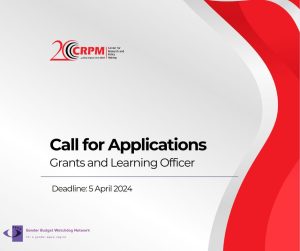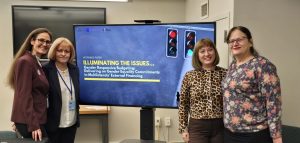Who we are
We are citizens and civil society organizations from around the globe, united by the shared conviction that inclusive and open public budgets are critical to achieving a world in which all human beings enjoy their full human rights – civil, political, social, economic, cultural and environmental.
For the past fifteen years we have learned, worked and struggled to make budgets and budget processes more transparent and participatory at all levels of government. We have demonstrated that civil society engagement can significantly improve budget processes, decisions and outcomes, and thus transform the lives of people.
The values of our global movement
Public budgets are raised through citizens’ contributions and the income generated by public assets. Thus, the founding belief of our movement is that participation in the decisions related to public budgets is a fundamental right and responsibility of all citizens.
We firmly commit to social equity and to the empowerment of the most marginalized, by advancing inclusion and equality as the guides to all our actions.
We resolutely commit to mutual respect and non-discrimination, affirming that we will make no distinctions based on caste, ethnicity, gender, race, religion or sexual orientation, among others.
We explicitly acknowledge our collective experience, and celebrate our diversity and flexibility to catalyze and support initiatives that build on this experience in a way that is most appropriate for each context.
We value and promote horizontal collaboration among all who join together for our cause through our movement.
We explicitly vow to adhere to the highest standards of integrity for our movement and declare our independence from political parties, governments, intergovernmental organizations, media and the business sector.
We strongly believe the time is now to advance accountability, participation and transparency of public budgets all over the world. To achieve this transformation, we coalesce around a shared vision, common principles, clear demands, and an agenda of action.
The world we want
It is often the case that citizens, and particularly those most marginalized, are excluded from participating in public budget decisions. It is both essential and possible to transform this current paradigm, by adhering to the following core principles:
- Public budgets must be transparent, meaning that all information related to the way in which public money is raised, allocated, spent and accounted should be made available to the general public in an accessible, timely and comprehensible way.
- Budget processes must be inclusive, ensuring open and ample opportunities for all citizens to fulfill their right to know about, participate in, and influence all decisions with regard to the collection, allocation and management of public funds.
- Budgets must be raised and spent efficiently, effectively, and equitably and must ensure that public resources achieve the greatest impact possible, in the elimination of poverty and the achievement of equity.
- Budget data must be accurate, relying on publicly known estimates and ensuring that governments spend public monies on the priorities for which they were approved, thereby reducing the room for leakages, corruption and inefficiencies.
- Budgets have to be comprehensive, encompassing all revenues and expenditures, regardless of their origin — including international aid, para-statal funds and the management of internal and external debt.
- Budgets have to be sustainable, ensuring that public finances serve common objectives over the long term, for current and future generations.
- Budgets have to be regularly and consistently reported against by all levels of government.
- Budgets must be the object of permanent monitoring, oversight and accountability by legislatures, internal and external audit institutions, the media and citizens.
We call upon:
All governments at the national and subnational levels to:
- Recognize, legislate, enact and operationalize the right to information generally and to public budget information specifically;
- Actively engage citizens and all other stakeholders in setting public budget priorities– including para-statal and para-fiscal funds– as early and inclusively as possible,
- Produce, and publicly discuss, in a timely fashion, at least eight key budget documents: pre-budget statement, executive’s budget proposal, enacted budget, citizens budget, in-year report, mid-year review, end-year report, audit report;
- Comprehensively report on all public financial flows and institutions, including those that are managed outside of the formal budget process;
- Include all resources used for the implementation of public, fiscal and economic policies, regardless of their origin, in their public budget documents and processes;
- Ensure that legislatures and auditors are independent of government and have sufficient resources to increase their capacity and thus fulfill their oversight mandates effectively.
- Publish and disseminate budget information in easy and accessible formats through all possible means, including digital open data formats through the internet, public libraries, information centers, etc.
Legislatures to:
- Increase their capacity to uphold their constitutional responsibilities as representatives of people’s needs first and foremost, not of government or their own interests;
- Take every necessary step to invite meaningful and inclusive participation of citizens in the public budget decision making and implementation process, through public hearings and submissions;
- Hold governments to account for raising public revenues and appropriately spending or misspending public funds.
Public Audit institutions to:
- Increase their capacity in terms of carrying out their oversight duties to hold government to account for the use of public resources;
- Work hand in hand with civil society to perform social audits;
- Work closely with civil society and legislatures to develop public expenditure principles, encompassing para-statal and para-fiscal funds, to better identify, denounce and seek remedy for the misuse of public funds;
- Audit governments with complete independence and hold governments to account for collecting and using public funds in accordance with the enacted public budget;
- Reach widely to account for all public funds, including the funds of off-budget institutions, to fully realize their function in terms of accountability.
Media to:
- Play its public interest role, by ensuring that accurate information about public budgets is widely understood and disseminated;
- Monitor and publicly report any incidents of the misuse of public funds;
- Highlight instances when civil society and citizens are contributing to improved public financial management;
- Collaborate with civil society organizations and citizens by providing them with spaces to disseminate and discuss their budget monitoring findings.
International governmental institutions and donors to:
- Support broad and deep engagement of citizens and other stakeholders in public budget matters;
- Underscore governments’ far-reaching duty to be accountable to their citizens;
- Collaborate with and support governments to enhance the timely production and release of public budget information, establish participatory processes and meet the highest standards of accountability;
- Collaborate with and support legislatures and audit institutions to enhance their capacity to fulfill their oversight duties, and to produce and release public budget information that is timely and relevant to hold governments to account;
- Provide governments with timely, accurate and comprehensive information on the foreign aid flows that they are providing, in formats that are compatible with government budget systems and processes;
- Improve their own practices to engender their own and governments’ transparency and accountability to citizens.
Citizens and civil society representatives to:
- Include public budget research, monitoring and advocacy in their efforts to realize social justice and human rights;
- Demand from their governments and legislatures information about public budgets and educate themselves about budgetary issues;
- Endorse and claim their right to participate in the budget process;
- Use access to information laws where they are already in place, and push for their adoption where not;
- Join our movement.
We call upon all governments and stakeholders across sectors to work together to establish and institutionalize global norms and standards to advance accountable, participatory and transparent public budgeting practices to ensure the full realization of human rights worldwide.






Leave a Reply